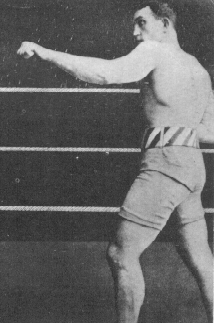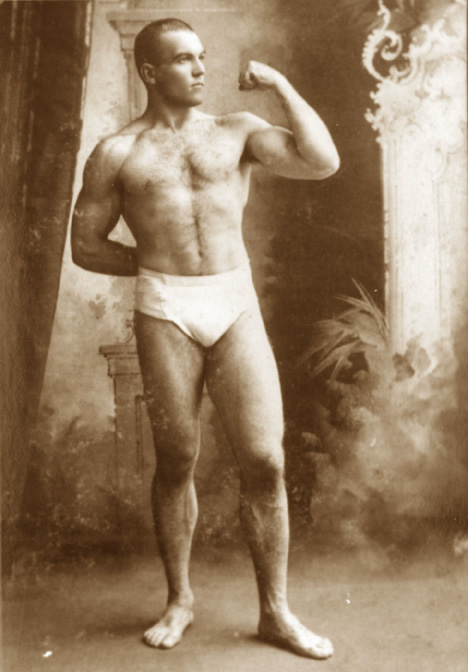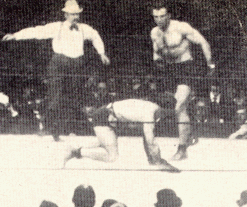

It is unfortunate, in many ways, that Jim Jeffries is remembered primarily for his loss to Jack Johnson. This would be like judging Joe Louis on his loss to Rocky Marciano, or Muhammad Ali off of his loss to Larry Holmes. Imagine those two fights as the most frequently shown films of Louis and Ali’s careers and with other films rarely seen. Does one imagine that these heroes of heavyweight history would be so fondly remembered?
It is sadly unfair to rate Jeffries off of his loss to Johnson. He had to lose over 100 pounds in training for this fight and had not fought in 6 years. Jeff, like Ali and Louis in their last fights, was clearly only a shell of his former self.
Let’s review a few facts about “Big Jeff.” He was never defeated during his prime. He was never knocked off his feet during his prime. He scored the quickest knockout in linear heavyweight championship history in 55 seconds. He offered to fight his top three challengers all in one night, but they refused. He won the title in only his 13th pro fight. He retired undefeated as champion, but came back after a long lay-off and lost to Jack Johnson in the fight that fans are most familiar with.
 Jim Jeffries, more so than Jack Dempsey, Rocky Marciano, or even Joe Louis stands up well when compared to big modern heavyweights. Jeff was 6’2 ½ and weighed about 217-218 at his peak according to newspaper accounts. With his 25” thighs, 17” calf, 10” ankle and 18” neck and thick bone structure, he had the size and dimensions to be a solid 230-pounder if he were fighting today. This is about the same size and weight as both Oliver McCall and Hasim Rahman both of whom scored knockouts over the giant Lennox Lewis.
Jim Jeffries, more so than Jack Dempsey, Rocky Marciano, or even Joe Louis stands up well when compared to big modern heavyweights. Jeff was 6’2 ½ and weighed about 217-218 at his peak according to newspaper accounts. With his 25” thighs, 17” calf, 10” ankle and 18” neck and thick bone structure, he had the size and dimensions to be a solid 230-pounder if he were fighting today. This is about the same size and weight as both Oliver McCall and Hasim Rahman both of whom scored knockouts over the giant Lennox Lewis.
Gilbert Odd, a historian and boxing book author wrote in 1974, "James J. Jeffries was the strongest of all the heavyweight champions." According to those in Jeffries training camp, Jeff, "a lover of hunting, once killed a large deer and carried it on his shoulders nine miles to camp without stopping to rest. Friends who accompanied him had difficulty keeping up with him on the jaunt home."
Jeffries had a lot more than just a modern heavyweights size and great strength going for him; he was also an outstanding natural athlete. John Durant, wrote in The Heavyweight Champions, “He was surprisingly fast and agile. He could run 100 yards in 11 seconds, and high jump 5 feet, 10 inches.” That is absolutely remarkable for a man of his size. Consider that Jesse Owens ran the 100-yard dash in 9.4 seconds a worlds record in 1936 (nowadays they run 100 meters). That a heavyweight boxer, not a track and field athlete, can accomplish such feats is the mark of an excellent athletic talent.
Eyewitness referee Billy Roche concurred saying Jeffries had the "acrobatic springiness of a circus tumbler in his legs. He was no lumbering ox, anchored to one spot, but a natural athlete."
Jim Jeffries was a strong heavyweight hitter. Not an explosive puncher like Louis or Tyson, but was a thudding slugger near the class of Liston or Foreman. Henry Cooper said that he “had a punch that might have knocked out a horse.”
The San Francisco Chronicle, Aug 16, 1903, reported that James Corbett had "a very bad night" after his fight with Jeffries, "the body blows that stung his stomach and kidneys with such unerring accuracy hurt the ex-champion grievously." Jeffries strong body attack left his opponents wracking in pain.
Jeffries best punch was his left hook to the body and head. Yet despite being a hard hitter most of his big fights went a number of rounds. Perhaps the best comparison one can make to modern heavyweights is to say Jeff was a bigger, and stronger version of Rocky Marciano or Joe Frazier. Jeff coming in low in his crouch, forcing opponents to punch down at him as he slipped inside like Marciano and hammering away at them to the body and head with his powerful left hooks like Joe Frazier. Jeffries also had proven endurance able to fight 25 rounds and still maintain his power late in the fight.
Tunney, a master ring strategist in his own right, described Jeffries style, “The ring strategy of Boilermaker Jim was entirely the thinking of the man who trained him for the championship fight with Fitzsimmons--Tommy Ryan, the great old-time middleweight champion, and one of the cagiest of them all. Tommy Ryan created the pattern of Jeffries' actions in the ring--taught him the famous crouch, body hunched away over and left hand stuck out….It was one of the most uninteresting of ring styles." It may have been uninteresting but it was effective. Fitzsimmons broke both of his hands punching down on Jeffries head.
Tex Rickard, the famous promoter, tended to agree, “There's no style to him, but he's the hardest hitter I ever saw. And that includes Dempsey."
Rickard further added that he regarded Jim Jeffries not Jack Dempsey as the greatest heavyweight he ever saw. He was of the opinion that, Jan 1931 Ring, “Jeffries would have knocked out Dempsey” and said, “You never seen an athlete in all the world like Jeffries. Boy what I would have given to see the real Jeffries tackle Johnson.”
At his peak, however, Jim actually developed good, solid boxing skills. In the second Corbett fight the Chronicle, Aug 15, 1903, said, “In the third (round) Jeff’s new born cleverness began to assert itself.”
Referee Ed Graney commented, “I was not prepared to see Jeffries outbox Corbett…I doubt the equal of his present self will ever exist.” This proves that Jeff had developed into a good all around fighter, that he was not just a big lumbering oaf with a punch. He was a skilled athletic heavyweight with boxing prowess who could slip inside and bang away at the body and take his man apart over the course of a fight. Jeffries knocked out Corbett in the 10th round. It was a systematic destruction of a very fast and skillful boxer. The Jeffries of this fight would be a threat to any heavyweight who ever lived.
Gene Tunney thought that “Jeffries' decisive quality was his tremendous physical toughness and endurance, the brawny giant who could hardly be hurt.”
Jeffries definitely could absorb some serious punishment as the second Fitzsimmons fight suggests. Fitz was possibly the hardest pound for pound puncher in history. Fitz, it is contended-though not proven- had loaded gloves in that fight. In the Chronicle on July 26, 1902, the day after the 2nd fight, the report says that Jeff went to shake hands with Fitz and says, "Those things on your hands cut me up a lot," said Jeffries feeling the tape on Fitzsimmons hands. "You didn't wear them the last time and your blows never cut me up they way they did tonight."
Lardner claims that Fitz had plaster of Paris under his bandages, that Jeffries’ trainer, Delaney, discovered it before the bout, but that allegedly Jeff shrugged and essentially did not care. Since the bandages were examined however it seems unlikely they contained plaster of Paris.
I offer an alternate possibility to the Jeffries-Fitz glove/bandage controversy. In those days they only wore 5-ounce gloves. The bandaging of hands was a novel occurrence at this time. No doubt they made Fitz's hands much harder. If one recalls the infamous Luis Resto-Billy Collins fight in NY in 1983, in that fight, Resto’s gloves had the padding removed and he beat Collins face to such a bloody horrific mess that Collins never fought again. This is the bout that got Panama Lewis banned from boxing for life in New York State. It is noteworthy that the Chronicle reports that Fitzsimmons tossed his gloves into the audience as Jeffries approached. Jeffries face was severely battered in this fight, bleeding and badly marked up. It seems quite likely, even probable, that this is what happened in their second fight. Billy Collins was not able to fight again after taking such terrible punishment. Jeffries knocked out Fitzsimmons with a single left hook in the 8th round and continued his fighting career, although a year passed before he would defend his title again.
Despite the battering he took Jeffries fought on and came out victorious. Cus D'Amato once said that when men of near equal skill meet- the man with the superior "will to win" -will win every time, unless the man's skill is so far above that of his opponent that his will is not tested. Jeffries would be second to none in the area of will.
 Fleischer demonstrated that Jeffries had both the ability to absorb punishment as well as lasting endurance, describing him as a “Herculean form with lignum vitae jaw and granite body. His defensive work was very effective, and while he was not of the most aggressive type, he managed to win many important battles by knockout following the tiring of opponents.”
Fleischer demonstrated that Jeffries had both the ability to absorb punishment as well as lasting endurance, describing him as a “Herculean form with lignum vitae jaw and granite body. His defensive work was very effective, and while he was not of the most aggressive type, he managed to win many important battles by knockout following the tiring of opponents.”
Jeffries trained the same way as today’s boxers, running, hitting bags, using pulley’s and rowing machines, jumping rope, and sparring. However, he also practiced wrestling as part of his training regimen. This, fighters of that period believed, would make them better and tougher in the clinches. Jeffries was a very good grappler and was strong in the trenches.
Given Jeffries size, strength, proven ability to absorb punishment, and natural athletic ability there is no doubt he would be a top heavyweight if he were fighting in the modern era. Given the current weak state of the heavyweight division in 2004, it is my contention that were he fighting today he would be world champion.
Jim Jeffries is a heavyweight for all time. Jeffries was bigger, stronger and faster than any of the previous bare-knuckle champions. There is little doubt he would have been the greatest bareknuckle champion of all time under London Prize Ring Rules. In fact John L. Sullivan said of Jeffries, "he's the fastest big man I ever saw in the ring." As a modern day heavyweight he would have the size, power and chin to be heavyweight champion today. Or with his aptitude for wrestling and with his endurance, he could be highly successful at no holds barred fighting. Jeffries defines what an ALL TIME heavyweight champion really is.
In 1904, when Jeffries was in his prime, Jack Johnson met with him trying to pressure Big Jeff into a title shot. Jeff, knowing the politics of the time, drew the color line. But he told Johnson in dead seriousness, "There's a cellar in the place. 'Tell you what I'll do. I won't meet you in the ring because you got no name and we wouldn't draw flies. But I'll go downstairs with you and lock the door on the inside. The one who comes out with the key will be the champ." Johnson refused and walked out. That's the kind of rugged man Jeffries was though, a real fighter. A boxer, a wrestler, a street-fighter. He could do it all.
In a survey of old-timers, conducted by John McCallum, Jeffries was ranked as the #1 All-Time Heavyweight (McCallum 1975 p 322). Nat Fleischer ranked Jeffries at #2. Charley Rose ranked him at #5. Historian Tracy Callis rates him # 1 on his all time heavyweight list.
Jim Jeffries Training Video